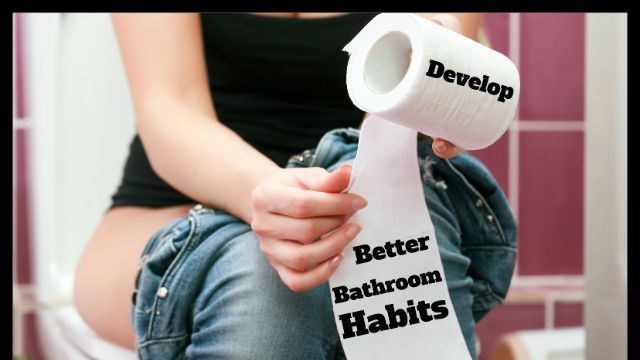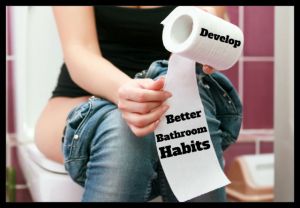
You may have heard of the book 7 Habits of Highly Effective People, the hugely successful book that has given millions of people tools to solve both professional and personal problems.
Developing healthy habits can not only help your personal and professional life, but can also influence your physical health.
According to Webster’s Dictionary, a habit is, “a usual way of behaving, something that a person does often in a regular and repeated way.” The repetition is what actually helps form a habit in the first place, good or bad.
When we talk about healthy habits we may speak of eating habits, sleeping habits, exercise habits and one lesser discussed habit – although equally as important – revolves around your elimination routine. Here are 7 such habits that can help you stay as healthy as possible.
Habit #1 Shut the Lid
When you use the bathroom it is paramount that you close the lid prior to flushing. Every time you flush, those germs and other particles become airborne. Lowering the lid before flushing can help limit the amount that gets into the air.
Keep in mind, this doesn’t mean you can leave out your toothbrush, as there are still some microorganisms that will be floating around. So… keep your toothbrush in a drawer or container, and try to remember to put that lid down before flushing!
Habit #2 Take a Peek
So, I bet you didn’t know that there was such a thing as a good poop? Perhaps you have not given it all that much thought. When it comes to body function and overall health, however, your poop is like a mirror.
We can learn a great deal about how our digestive system is functioning by the sight, sound and even smell of our poop.
5 Distinguishing Features of a Good Poop
- Solid, smooth and log-shaped
- Chocolate brown color
- Sinks to the bottom of the toilet
- Contains no blood, mucous or fat
- Has no odor
5 Distinguishing Features of a Bad Poop
- Formless or loose
- Pale in color
- Floats on the surface of water
- Contains deposits of blood, fat and mucous
- Has a bad odor
Habit #3 Take a Whiff
Normal urine should not have a strong odor, but there are also many substances that can alter the way your pee smells. Urine is the reflection of what is going on inside of your body and contains many metabolic by-products and compounds. Some dogs are even able to “smell cancer” in humans.
If your urine has a very pungent aroma, like ammonia, it could be an indication of a urinary infection, urinary stones or a sign of dehydration. Because dehydration causes urine to become concentrated, it will have a stronger than usual odor. According to MDHealth.com, menopause, some sexually transmitted diseases and certain metabolic conditions can also increase the ammonia smell.
Habit #4 Go Often
Let’s face it: we have all been in a situation where we have to pee like a racehorse but we hold back. Sometimes when that happens the urge to go lessens and we actually forget to go, or hold it for as long as we can before exploding. Believe it or not, there are some consequences to ignoring nature’s call.
An average size bladder can hold about 15 ounces of liquid. Holding your urine beyond this capacity can actually stretch your bladder. It is the feedback mechanism in the bladder that is responsible for letting the brain know that it is time to empty.
If you keep yourself from peeing you may, in time, not be able to recognize this signal from the brain. In addition, the longer you hold your urine the more likely your bladder will become a breeding ground for bacteria. This can cause infections which may spread to other parts of your body. So… go often and for sure, go when you have to!
Habit #5 Wipe Right
Contrary to what you might think, there is a right way to wipe. Wiping the wrong way could cause you to drag dangerous bacteria into places it doesn’t belong. Proper wiping form should start with wiping while sitting, lifting up on one cheek and wiping from the front to the back.
Be sure to continue wiping until your toilet paper is pretty clean. Use moderate pressure so that you don’t irritate your skin. Ladies, it is especially important for you to remember to always wipe from front to back.
Habit #6 Don’t Read
Even though it may seem like a great place to finish that book you’ve been reading, sitting too long on the toilet can actually encourage the development of hemorrhoids. Hemorrhoids come from anatomical structures called anal cushions – they are like small balloons in the wall of the anal canal.
When these anal cushions are stretched or get irritated, they develop into what we know as hemorrhoids. Sitting too long on the toilet can increase this pressure. Bowel movements should be quick, and if you want to read, wipe, close the lid, flush and sit back down for a little quiet time.
Habit #7 Don’t Ignore
It is wise to stay plugged in to your normal elimination habits. Changes in these habits may indicate a digestive issue or other problem that requires some attention. For instance, urine can fluctuate in color and odor depending on what you are eating and drinking, how active you are, the time of day or what supplements you are taking. However, urine color and odor can also be an indication of something more serious.
If your urine is super clear it may mean that you are drinking too many fluids. Be careful not to over-hydrate. The best rule of thumb is to aim for half of your body weight in ounces each day. Glowing yellow urine may be the result of excess vitamins that are not being absorbed by your body.
When your urine is dark yellow or gold it generally means only one thing: you are dehydrated. This can be the result of excessive exercise, heat or sickness. Dark brown or tea-colored urine can be an indication of a liver condition, especially if this is accompanied by a yellow complexion or pale-colored stools. Blood in the urine from a bladder or kidney infection may cause your urine to turn pink or red.
Likewise, if you notice a change in the consistency, color or frequency of your bowel movements, you may need to do a little evaluation. For instance, if you find that you are constipated often you may need to take a look at your diet.
Constipation is an annoying and often painful condition that millions of Americans suffer from. If you have less than 3 stools per week, you are constipated. If you have less than one stool per week, you are severely constipated.
 The cause of constipation can be traced back to any number of things, including poor diet, medication, poor bowel habits, dehydration, hormonal disorders and laxative abuse. For many people, the discomfort of constipation becomes so great that they reach for over-the-counter medications for relief. Unfortunately, many of these medications only mask the symptoms and can make the problem worse.
The cause of constipation can be traced back to any number of things, including poor diet, medication, poor bowel habits, dehydration, hormonal disorders and laxative abuse. For many people, the discomfort of constipation becomes so great that they reach for over-the-counter medications for relief. Unfortunately, many of these medications only mask the symptoms and can make the problem worse.
So, do what you can to work on adopting these healthy elimination habits and before long you will reap the benefits of consistency in the bathroom!
-The Alternative Daily

